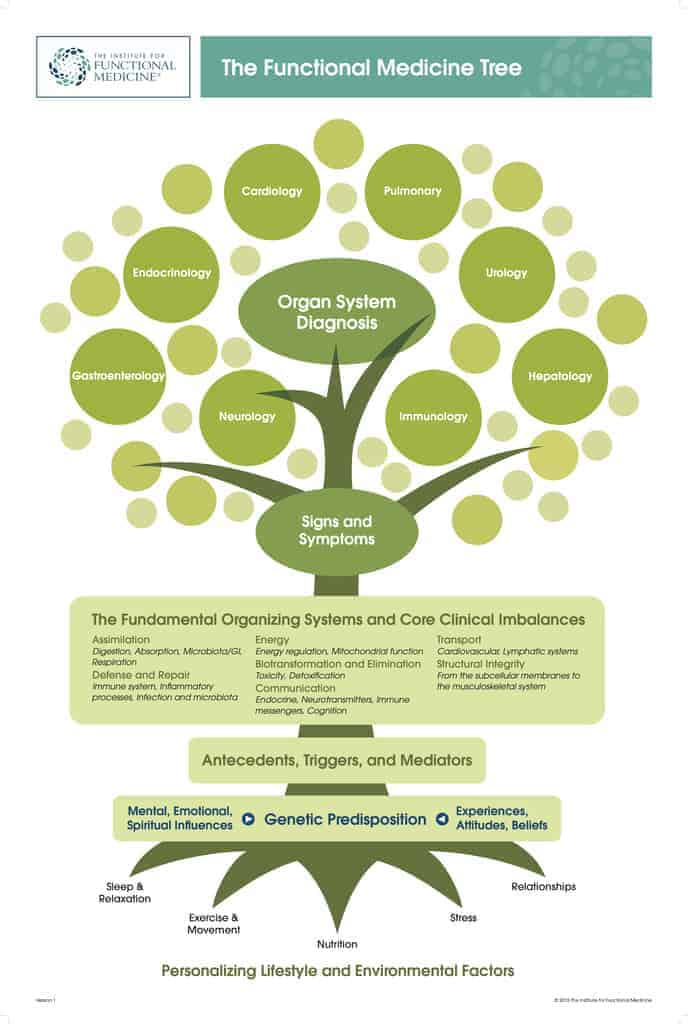Functional medicine combines current science and evidence-based practices with a natural, holistic and patient-centered approach to health care. The Functional Medicine Consultation is the first step in a process for your individualized, comprehensive treatment plan. The initial evaluation will last 90 minutes and include a Functional Matrix based evaluation of the different body systems and how they interact together. The Functional Medicine Matrix is similar to the Chinese 5 element chart in the way that it illustrates the interconnectedness of the body systems and the importance of mind-body medicine.
Functional Medicine
Functional Medicine Consultation
- An evaluation of environment and family history influences
- Dietary influences on genetic expression and metabolic function
- Metabolic conditions resulting as a system malfunction
- Mind-body influences on biochemistry and genetic expression
- Functional lab testing and possible genetic evaluation
Personalized Plan
After the initial consultation, a personalized diet, lifestyle and nutritional treatment plan will be created to empower you to be a partner in your own health. Understanding the functional lab tests as markers to specific pre-disease conditions and genetic predispositions, help you to understand how your body works in a deeper and more meaningful way. You will also understand how your family history, environment, and diet affect your health preventatively to reach your optimal health. Depending on your current level of health, these treatment plans are reevaluated every 2 weeks during your care. Your practitioner will recommend a 30, 60, or 90-day comprehensive & personalized plan made just for you.
Functional Medicine Diagnostic Testing
These tests can be collected in a lab or in the comfort of your home. The functional labs we use incorporate current laboratory science that look at individual, biochemistry and hormonal pathways to assist us in understanding complex health conditions and directing health care in the most efficient way. There are many functional lab tests we can utilize depending on each individual woman. However, there are specific types of tests that are particularly important in our clinic for women entering menopause:
Blood Testing – Serum lab testing of hormones is an easy, inexpensive way to get an overview of a women’s health. Some of the typical blood tests that can be important include complete sex hormone testing, complete thyroid panel with antibodies, a chemistry panel, iron/ferritin/homocysteine and vitamin-D levels. Other specific lab tests are also considered individually.
Hormone Saliva Testing – A hormone salivary test helps us to see the individual hormone rhythm of a women throughout her entire 28-day cycle. A home kit is provided to allow the patient to submit a saliva sample every 3rd day of her cycle for a total of 11 samples. Analysis of estrogens, progesterone, and testosterone can assist in the evaluation of menstrual irregularities and premenopausal symptoms.
Dutch Test (dried urinary for comprehensive hormones) – This innovative test shows a complete picture of hormones and their metabolites, including cortisol circadian rhythm, to assess adrenal health and melatonin. It is useful for women who are considering taking bio-identical or synthetic hormones or for perimenopausal women. It can tell us not only how much estrogen, testosterone, etc. she is making but how it is being detoxified and broken down in a healthy or not-so-healthy way. This information can help us be aware of the risk for breast or uterine cancer for each women individually.
The Dutch test is also a more accurate way than saliva testing to measure free cortisol and to monitor hypothalamic-pituitary-adrenal axis (HPA axis) regulation, which is how our brain and adrenals communicate. Since we know that our hormone balance is closely connected to our HPA axis, it is important to test them at the same time to get the big picture.
Nutrition Profiles – A comprehensive nutritional evaluation to identify specific deficiencies of vitamins and nutrients that are essential for optimal health and wellness.
Organic Acids Testing – A comprehensive view of organic acids shows the body’s cellular metabolic processes and breakdown. This 24-hour urine test looks at energy production, detoxification, neurotransmitter breakdown and intestinal bacteria or yeast. Women’s health is often complex and this test can give us information on which body systems are out of balance for the most effective treatment plan.
An organic acids test is ideal for patients who may suffer from:
- Weight issues
- Sleep problems
- Mood disorders
- Chemical sensitivities
- Fatigue
Complete Stool Analysis – Functional stool tests assess three critical areas of gut health: digestive function, gut inflammation and the gut microbiome (good and bad bacteria). These areas not only affect digestive health but overall health and function within all the body systems as well. For women with specific symptoms that may have gastrointestinal dysfunction as the root cause of hormonal imbalance, a comprehensive stool test can provide insight into a more effective treatment plan.
Imbalances in the microbiome have been studied extensively as the source of certain conditions which may include:
- Autoimmune disease
- Irritable bowel syndrome (IBS)
- Inflammatory bowel disease (IBD)
- Diabetes
- Obesity
- Celiac disease
- Mood disorders
- Alzheimer’s disease
- Food allergies
Genomics Testing – Genetic testing is primarily used to evaluate common genetic variations known as single nucleotide polymorphisms (SNPs). The presence of specific SNPs may indicate a predisposition for health vulnerabilities and we can then, focus on lifestyle changes to maintain health and wellness. SNPS may be assessed in multiple functional areas including cardiovascular, detoxification, methylation, immune modulation, and estrogen metabolism.
Genetic testing uncovers potential susceptibility to diseases and conditions such as:
- Breast cancer
- Osteoporosis
- Thrombosis
- Strokes
- Heart Disease
- Autoimmune conditions
Testing for Toxins – Exposure to environmental toxins can affect health and are often unavoidable. Finding the root cause of chronic health conditions can often include evaluating your levels of heavy metals, essential elements and mycotoxins in your body. We test for lead (paint or pipes in older homes), mercury (fillings/fish), cadmium (cigarette smoke), copper/zinc (excess/deficiencly) and mycotoxins (mold). These home test kits provide insights that can help to help to support and often reverse complex conditions.
Chronic exposure to heavy metals can result in experiencing symptoms such as:
- Anxiety and depression
- Increased cancer risk
- Deteriorating eye health
- Digestive problems
- Fatigue
- Headaches
- Infertility
- Memory problems
- Mental “fogginess”
- Less than optimal heart and/or blood vessel function
- Less than optimal immune function (recurrent infections, autoimmune diseases)
- Tingling sensations in the hands, feet, and/or around the mouth
- Shakiness or tremors
The Functional Medicine Tree
The tree below illustrates the core aspects of a Functional Medicine approach to health. Functional Medicine focuses on the foundational elements of health (soil and roots), as opposed to the conventional medicine approach which only focuses on separate body organs and symptoms (branches and leaves). To maintain optimal health, you need to nurture and support the most basic and essential elements of health down in the roots and soil, in order to ensure healthy functioning of the organ systems up in the branches and leaves.



